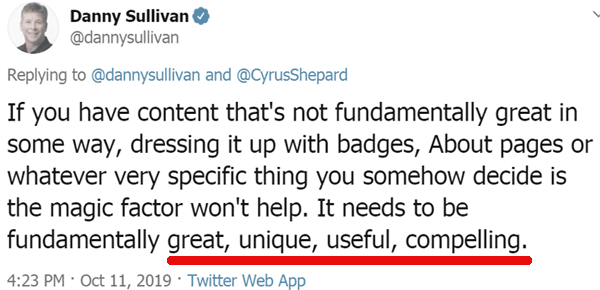
Google’s Danny Sullivan tweeted that SEOs should focus on content that is “great, unique, useful, compelling.” Some in the search community pushed back on the idea.
Ranking Factors and Content
The context of Danny Sullivan’s statement is in responding to a tweet by Cyrus Shepard:
“Google’s statements on ranking factors are like onions. They have layers. And when you peel too many layers, you start to cry”
Danny asserted that what SEOs should focus on is making great content that is useful, compelling, etc.Danny Sullivan tweeted this response:
“If you have content that’s not fundamentally great in some way, dressing it up with badges, About pages or whatever very specific thing you somehow decide is the magic factor won’t help.
It needs to be fundamentally great, unique, useful, compelling.“

Great Content is Not Always Comprehensive
A common mistake made with content is understanding greatness as being comprehensive. Comprehensive means covering a topic from beginning to end.
However, not every topic needs to be comprehensive. The reason why short content sometimes beats comprehensive content is because sometimes a search query is satisfied by a 400 word answer.
This is particularly true in “how to” type search queries that are highly specific. If those kinds of queries can be expressed in short steps (step 1, step 2, etc.), then your users may be happier to see it answered that way.
Why Comprehensive Content Loses Rankings
Comprehensive content can tend to drift off topic. Content that ranks well tends to be on topic. Content that ranks on page two of the search results tends to contain “side topics” that aren’t essential to the main topic.
For example, if the keyword phrase is “how to catch striped bass,” introducing place names (entities) like Cape Cod, Montauk and Rhode Island into your “comprehensive” web page about catching striped bass will alter the topic of the web page.
The page won’t necessarily rank for “how to catch striped bass” but it may begin to rank for the keyword phrase plus those geographic locations (entities).
Off Topic Metaphors, Jargon, and Analogies
In my opinion, another way publishers kill their content is by using wildly off topic metaphors, jargon, and analogies. Doing it once is probably okay.
But peppering the entire web page with multiple instances of off topic elements is, in my opinion from studying why some sites are high ranked and some are low ranked, a sure way to lower the relevance of the page.
This is a common mistake of content that lost rankings in Google broad core updates. Every time Google tightens it’s association between content and search queries, web pages with off topic content starts to lose rankings.
I’m not saying being off topic is the only reason why web pages lose rankings. I’m pointing out that this is one reason out of many that pages tend to lose rankings.
Some pages lose rankings for other reasons entirely. But that’s outside of the focus of this article.
Returning to the example of “how to catch striped bass,” a common jargon in New England for a big striped bass is the word, cow.
But Google does not understand that the word “cow” in the context of fishing. Do a search for the phrase “how to fish for a cow” or “how to catch a cow from shore” and you’ll see that Google strongly associates the word (entity) cow with livestock.
So if your web page uses the word “cow” and livestock related phrases (rounding up cow stripers) in an article, it’s possible that Google may begin to associate your web page about catching striped bass with the animals that moo.
Content that Ranks is Concise and On Topic
There are many reasons why great content loses rankings in Google core algorithm updates. When doing site audits, one reason that I see now and then is the tendency to confuse “comprehensive” with being useful. Another reason I see some sites lose rankings is because the content is off topic.
Content that Ranks is Relevant to Users
Another common mistake is writing content about keywords. I find that it’s useful to write to the user intent.
When you’re talking about user intent, in my opinion you’re really talking about:
- Aspirations
What does that keyword phrase indicate the user is aspiring to? - Needs
What does the keyword phrase indicate the user needs? - Goals
What does the keyword phrase indicate are the users goals?
Let’s “de-jargonize” this: Understand WHY the user is making a search query then provide the solution. Let the search results be your guide to what the user means when they type a certain search query.
Great means being above average, standing above and apart from others. In my opinion, true greatness lies in serving the user and that means focusing on aspirations, needs and goals in a way that is delivered quickly and efficiently.
Danny Sullivan suggested it was a good idea to create content that is useful. Focusing on being useful is the first step toward creating content that ranks well.
Source: https://www.searchenginejournal.com
